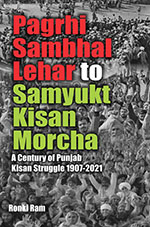The book under review focuses on the recent farmers movement that lasted for one and half years and ended only when the Union Government withdrew the three farm laws against which the farmers had put up a peaceful resistance, ensconced on the borders of the national capital territory of Delhi. The movement led the farmers’ unions to form their own party (Samyukt Kisan Morcha) in Punjab and enter into the electoral arena. Farmers’ issues dominated the electoral campaign and contestant parties held out seductive promises to get their vote in the run-up to the assembly elections. The reverberations were felt also in the election-bound Uttar Pradesh, especially in its north-western region, and to some extent in Haryana.
The three farm laws had first come in the form of ordinances, promulgated by the Central Government on June 5, 2020. Despite opposition from farmers, the ordinances were passed in the form of legislative Acts on 27 September 2020 in Parliament. The Union Government got the three laws repealed by getting Parliament to pass the Farm Laws Repeal Act, 2021. The position of the Union Government had all along been that the laws were pro-farmer and would have brought in much-needed agrarian reforms, which were once on the agenda of the Congress also.
The three repealed Acts were: Farmers’ Produce Trade and Commerce (Promotion and Facilitation) Act, 2020; The Farmers (Empowerment and Protection) Agreement on Price Assurance and Farm Services Act, 2020; and the Essential Commodities (Amendment) Act, 2020. The first Act provided for the ‘creation of an ecosystem where the farmers and traders enjoy the freedom of choice relating to sale and purchase of farmers’ produce which facilitate remunerative prices through alternative trading channels.

